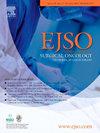新辅助化疗后接受微创根治性胃切除术的患者围手术期ERAS管理的短期和长期疗效:单中心回顾性倾向评分匹配研究。
IF 3.5
2区 医学
Q2 ONCOLOGY
引用次数: 0
摘要
导言接受新辅助化疗(NACT)的胃癌患者更容易受到围手术期应激反应的影响。加强术后恢复(ERAS)被广泛应用于外科手术患者,旨在减少应激反应。然而,这种方法对于接受微创根治性胃切除术(NACT)后的胃癌患者是否安全可行仍未确定。因此,本研究旨在调查 ERAS 对这一特殊胃癌患者群体的影响:收集在 NACT 术后接受微创根治性胃切除术的胃癌患者的数据。根据患者是否接受围手术期 ERAS 管理,将其分为 ERAS 组和常规组。为消除偏差,进行了倾向评分匹配。观察了术前和术后炎症和营养标记物水平、术后并发症、恢复指数以及3年OS和RFS:结果:1:1 PSM后共分析了252例患者,其中ERAS组126例,常规组126例。结果显示,实施ERAS后,新型炎症指标水平明显降低,营养状况得到改善,术后恢复加快。我们发现,与传统组相比,ERAS组的3年OS(72.2% vs. 66.7%)和RFS(67.5% vs. 61.9%)呈改善趋势,尤其是III期患者,但这些差异并不明显:结论:对于在NACT术后接受微创根治性胃切除术的胃癌患者来说,围手术期ERAS方案是安全可行的。本文章由计算机程序翻译,如有差异,请以英文原文为准。
Short- and long-term outcomes following perioperative ERAS management in patients undergoing minimally invasive radical gastrectomy after neoadjuvant chemotherapy: A single-center retrospective propensity score matching study
Introduction
Gastric cancer patients receiving neoadjuvant chemotherapy (NACT) are more vulnerable to perioperative stress. Enhanced recovery after surgery (ERAS) is widely used in surgical patients aiming at reducing stress responses. However, whether this approach is safe and feasible for gastric cancer patients received minimally invasive radical gastrectomy after NACT remained determined. So, the objective of this study is to investigate the effects of ERAS for this special group of gastric cancer patients.
Material and methods
The data of gastric cancer patients who underwent minimally invasive radical gastrectomy after NACT were collected. Patients were divided into an ERAS group and a conventional group based on whether they received perioperative ERAS management. Propensity score matching was conducted to eliminate bias. Pre- and postoperative inflammatory and nutritional marker levels, postoperative complications, recovery indices and 3-year OS and RFS were observed.
Results
A total of 252 patients were analyzed after 1:1 PSM, including 126 patients in the ERAS group and 126 in the conventional group. The results showed that the implementation of ERAS significantly reduced the levels of novel inflammatory indicators, improve nutritional status and accelerate postoperative recovery. We found that the 3-year OS (72.2 % vs. 66.7 %) and RFS (67.5 % vs. 61.9 %) in the ERAS group showed an improvement trend compared to those in the traditional group, especially for stage III patients, although these differences were not significant.
Conclusion
The perioperative ERAS program is safe and feasible for gastric cancer patients received minimally invasive radical gastrectomy after NACT.
求助全文
通过发布文献求助,成功后即可免费获取论文全文。
去求助
来源期刊

Ejso
医学-外科
CiteScore
6.40
自引率
2.60%
发文量
1148
审稿时长
41 days
期刊介绍:
JSO - European Journal of Surgical Oncology ("the Journal of Cancer Surgery") is the Official Journal of the European Society of Surgical Oncology and BASO ~ the Association for Cancer Surgery.
The EJSO aims to advance surgical oncology research and practice through the publication of original research articles, review articles, editorials, debates and correspondence.
 求助内容:
求助内容: 应助结果提醒方式:
应助结果提醒方式:


